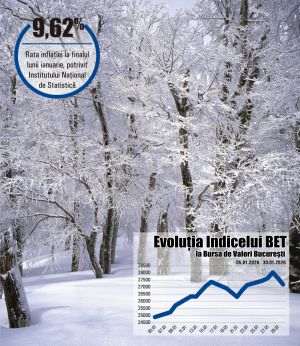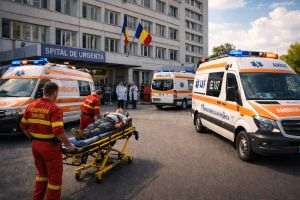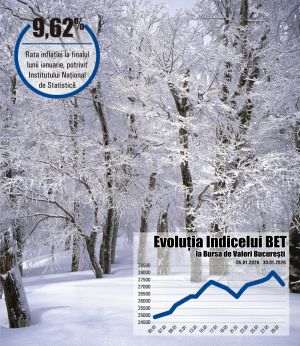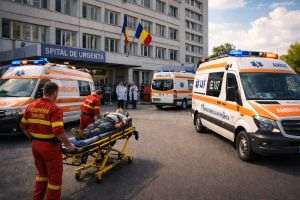• The recovery of the economy in 2011, supported by the increased confidence of investors and Romanian consumers
Reporter: Mr. Chairman, what is your take on the evolution of the economy in 2010? What are the positive and the negative aspects that you feel are worth mentioning?
Mişu Negriţoiu: Our initial expectations were that the economy would recover in 2010 (see the forecast made by ING Bank in March 2010). Unfortunately, this hasn"t happened (the GDP will probably see a -2% drop by the end of the year), and Romania"s problems have actually worsened.
On the bright side, 2010 was a year of "fiscal corrections" (which should have happened in 2009 at the latest!) in order allow a reduction of the budget deficit which could have caused Romania to enter a dangerous slide. Therefore, the implementation of austerity measures was needed, measures which should have a positive effect on the medium-long term, provided the reforms which began this year will be implemented in the years to come. The agreement with the IMF and the EU concluded in 2009 has produced its effects, and has allowed Romania to get ahead of Greece or other European countries in adopting the adjustment measures intended to improve the state of the public budget and regain its credibility on the financial markets. This was another positive aspect.
On the negative side, I would mention the delayed implementation of the fiscal adjustment policies, the ongoing hesitations accompanied by a general political "instability", as well as the government"s lack of resolution when it comes to the development of some major projects which would help the economy return to growth.
Reporter: How do you expect the economy to go in 2011?
Mişu Negriţoiu: The most likely scenario for 2011 is that the GDP will stop dropping, and we will actually see the economy grow this year (the market consensus is 1-2%) despite the restrictive effects of the fiscal policy, as revenue, consumption and investments will resume growth. The authorities have just announced new fiscal adjustments, which, even though they are not very harsh, pose the risk of causing a drop in consumption in the first quarter of 2011, perhaps even in the first semester. The delayed effect of the wage cuts which were implemented in July 2010, could have a similar result.
The recovery could be supported by the increase in investor confidence following the fiscal adjustment measures, by the overall improvement of the world"s situation and the increased confidence of Romanian consumers. This could be supported by the stabilization of the Romanian economy, as well as by the announced raise of the wages in the public sector.
Reporter: Which sectors do you feel will perform the best, and why?
Mişu Negriţoiu: Industry will remain the sector with the best performance in 2011 and with the largest contribution to the GDP. The reason for this is the fact that investment will mostly go to a sector which is also doing well right now. Foreign demand is expected to remain quite strong, even though it may drop slightly compared to 2010.
A stabilization in the other sectors (services, agriculture), is possible, with the exception of the construction sector, where a continuation of the downward trend is not out of the question, given the latest statistical data, and the imbalance that existed in the sector a few years before the crisis.
Reporter: Do you have any advice/suggestions to make to the government and to the NBR for 2011?
Mişu Negriţoiu: I think that both the government and the NBR are doing their job well when it comes to keeping the macroeconomic stability and exiting the recession, in spite of the population"s discontent and unhappiness. I think the only thing that they could be reproached is the fact that they took too long to do the necessary steps, and if they had been made on time the expectations of the population would have been different.
Reporter: In your opinion, what are the difficulties that companies will be faced with next year?
Mişu Negriţoiu: Taxation will likely remain an unknown variable in 2011, but there will probably be less uncertainty on the matter. Since domestic demand will remain anemic, I think that Romanian companies will need to increase their efficiency in order to successfully handle increased competition on a regional and global level. Association with other private companies - both domestic and foreign - would be increasingly useful - unlike those who mostly do business with the state.
Reporter: How will Romania"s citizens fare this year? What are your forecasts on the unemployment rate and the evolution of non-performing loans?
Mişu Negriţoiu: I spoke earlier about the increase of the revenues which could truly stimulate the economic growth. But even when the economy recovers, jobs are still hard to come by, and the increase in wages is relatively modest.
The unemployment rate will probably drop, but only slightly, because no jobs are being created during the recovery stage of the economic cycle. Also, given the extent of Romania"s dependence on foreign financing, Romania"s economic recovery can"t be quick, since Western banks will not only be cautious in their relation with Romania, but also with the countries in Central and Eastern Europe in general.
The nominal volume of non-performing loans is likely to continue to rise following their explicit "acknowledgement", but also given the delayed reaction to the economic recovery. We should eventually see their stabilization and a reduction in their numbers in the second half of 2012.
Reporter: Do you think there are any chances of seeing lending resume next year? If yes, on which segments?
Mişu Negriţoiu: I think that the expectations for a resumption in lending are legitimate, even though it will only happen at a moderate pace (10-15%), but mostly in the second half of the year. We definitely won"t see the growth rates that occurred before the crisis any time soon. Foreign currency lending has already recovered last year, if we take into account that currently, the annual growth rate is currently about 7%, and it was 9% at a certain moment. Foreign currency loans will probably see higher growth than those in lei. Lending in lei is expected to gradually rise in 2011, together with the economic recovery. But we can"t hope for growth rates of 20-30%!
Industry will remain the sector with the best performance in 2011 and with the largest contribution to the GDP.
•
I think that Romanian companies will need to increase their efficiency in order to successfully handle increased competition on a regional and global level.
•
Given the extent of Romania"s dependence on foreign financing, its economic recovery can"t be quick, since Western banks will not only be cautious in their relation with Romania, but also with the countries in Central and Eastern Europe in general.
















































